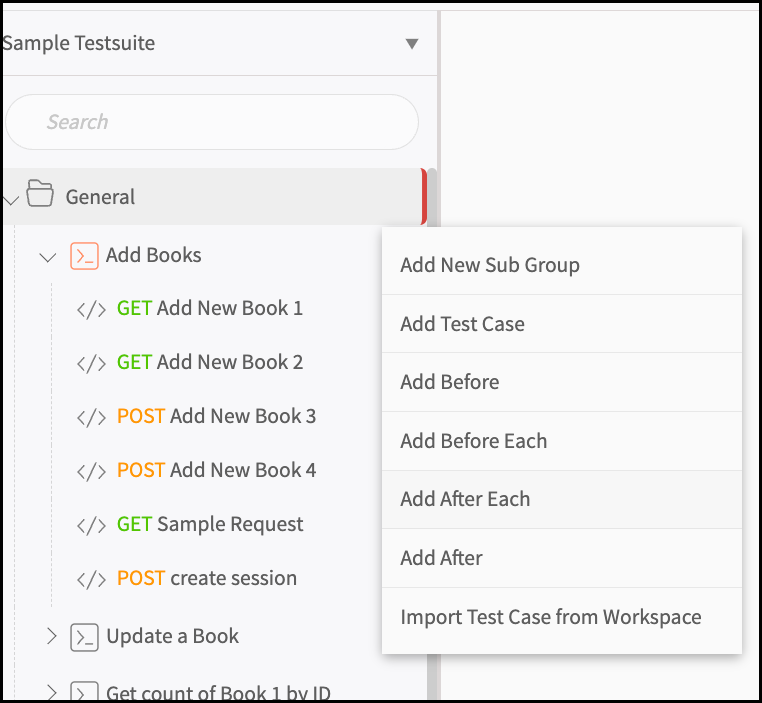What are "Hooks" in PostQode ?
Hooks in PostQode are powerful features that allow you to execute the specific API calls at certain points during the testing process. By using hooks, you can enhance the flexibility and efficiency of your test suites, which makes it easier to set up, prepare, clean up, and tear down the testing environment.
Types of Hooks Available
PostQode supports four types of hooks as given below:
-
Before (before):
- You can use this hook to set up the testing environment for authentication or creating the necessary data.
- Example: Call a login API and store the access token for use in subsequent tests.
-
Before Each (beforeEach):
- Executes a set of APIs before each individual test case within a group.
- You can use this to re-set the test state or create a fresh test data for each test.
- Example: Call an API to create a new test product before each test case.
-
After Each (afterEach):
- Executes a set of APIs after each individual test case, without considering its outcome.
- You can use this to clean up the resources or to re-set the state after each test.
- Example: Call an API to delete test data created during a test.
-
After (after):
- Executes a set of APIs once after all tests in a group to clean up the test environment.
- Perfect for final cleanup and teardown of the testing environment.
- Example: Call logout APIs or delete all the test data created during the testing process.
Any data set in a local variable using pq.variables.set("variableName", value); within a before hook will be available throughout the entire testing lifecycle, including all the hooks. This ensures that the variables initialized during the setup can be used consistently and referred during the test execution and teardown processes.

How to Use Hooks Effectively
A few ways to use the hooks effectively and to improve the API testing workflow are given below:
-
Manage Authentication: Use the 'before' hook to call login APIs and store the authentication tokens. This ensures that all the tests are having the necessary authentication without repeating the API calls.
-
Control Test Data: Use 'beforeEach' and 'afterEach' hooks to call APIs that create and delete the test data. This ensures a consistent starting point for each test case.
-
Configure Your Environment: The 'before' hook is optimal for calling APIs that set up environment variables or configurations used across multiple tests.
-
Clean Up Resources: Use 'after' hooks to call APIs that ensure all the resources that are created during the testing are cleaned up properly. This prevents the data buildup and potential conflicts in future test runs.
-
Handle API Dependencies: Manage the dependencies between APIs using hooks. For example, in an e-commerce scenario, use "before" hooks to call APIs that create products and categories before testing order APIs.
Benefits of Using Hooks in Your Tests
- Better Organization: Hooks help to structure your tests by separating the setup, teardown, and the actual test API calls.
- Less Repetition: Centralizes the common API calls in hooks to eliminate any duplication across the test cases.
- Consistent Testing: Ensures to run each test in a consistent, predictable environment by using hooks for setup and cleanup the API calls.
- Efficient Resource Management: Properly allocates and de-allocates the resources through the API calls and improve the test reliability.
- Easier Maintenance: Separating setup and cleanup API calls from test cases simplifies test suite maintenance and updates.
By leveraging hooks in your API tests, you can create more maintainable, efficient, and reliable test suites. This approach allows you to focus more on writing meaningful test scenarios and less on repetitive setup and teardown API calls.